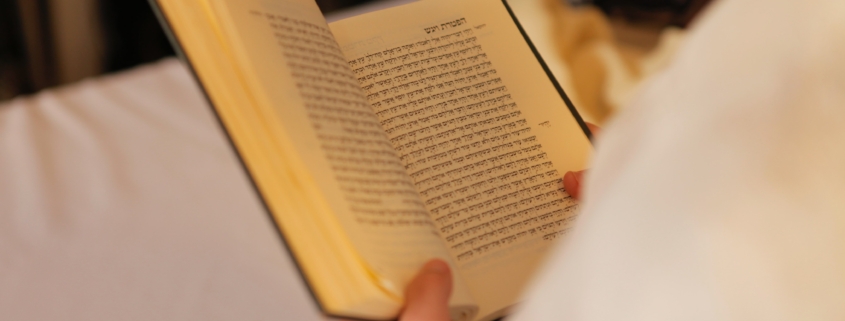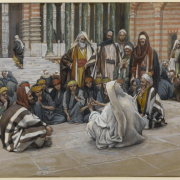What Is the Relationship Between the Two Testaments?
A Shabbat dinner in Rio de Janeiro, Brazil may be an odd place to start for this article, but that is where my wife and I recently met a new Israeli friend. Mutual friends connected us since we were both backpacking in South America and happened to be in Rio at the same time. We met up at a Shabbat dinner and quickly became friends. The sights and sounds of Rio fascinated us as we strolled along the beach and embarked on a tour of Rio to see the Jesus statue, Sugarloaf Mountain, and many other tourist sites. One evening we went in search of Israeli falafel and hummus for dinner. Finding none, we chose the closest thing we could find – Lebanese shawarma. While enjoying our food, our new friend posed a question, “What is the relationship between the Old and New Testaments?” What a question! He asked me this because I am Jewish and believe in Jesus. I began by explaining that the Old Testament set expectations for future fulfillments of God’s promises.
Throughout the Old Testament, God made many promises to our people. Take for example the promise that God made to give us the land of Canaan. God told Abraham, “I will give to you and to your offspring… all the land of Canaan, for an everlasting possession” (Genesis 17:8). The narrative of the Torah continues with the patriarchs, the escape from Egypt, and forty years in the wilderness. At the end of the Torah, Israel was preparing to enter the Promised Land, and Moses died just before being able to enter it (Deuteronomy 34). If this were the end of the story, we would be left with a lot of questions. Did the Jewish people enter the land? Did God keep his promise? Thankfully, we have the book of Joshua, which continues the story and tells us, “The Lord gave to Israel all the land that he swore to give to their fathers. And they took possession of it, and they settled there” (Joshua 21:43). The book of Joshua stands as a witness that God kept his promise. Imagine what we would be missing if we didn’t have Joshua!
In the Old Testament, God also promised to give a new covenant to our people. Jeremiah foretold the amazing blessings of this covenant and how it would differ from the covenant given after the Exodus (Jeremiah 31:31–34). When we escaped from Egypt, God made a covenant (or agreement) with us to bless us for obedience to His commandments. However, the covenant also included punishment for disobedience (Deuteronomy 28). Unfortunately, we did not obey and suffered the consequences. Fortunately, the new covenant that Jeremiah promised does not depend on our obedience, but instead depends on God. He promised, “I will write [the law] on their hearts” and “I will forgive their iniquity, and I will remember their sin no more” (Jeremiah 31:33–34). What an incredible promise of complete forgiveness and reconciliation with God! But no fulfillment is recorded in the Old Testament, and we are left with a question, “Did God keep his promise to give the new covenant?”
The expectation of the promised Messiah is also set forth in the Old Testament. The understanding of who the Messiah would be is an unfolding picture as the Scriptures progress. The Torah reveals that he will be a prophet like Moses (Deuteronomy 18:15–18) from the tribe of Judah (Genesis 49:10). According to the prophets, he will be the son of a virgin (Isaiah 7:14) and a miracle worker who heals the blind, deaf, and lame (Isaiah 35:5–6). The prophets also described the Messiah’s dual-purpose mission: first, he will bring peace to the human soul by forgiving sin through his own sacrifice (Isaiah 52:13–53:12), and second, he will bring peace to the world by establishing his kingdom on earth (Zechariah 14). But once again no fulfillment is recorded in the Old Testament, and we are left with the question, “Did God keep his promise to send the Messiah?”
Thankfully, we have the New Testament, which continues the story of God keeping His promises. The book of Luke tells the story of Jesus’ birth, life, death, and resurrection. Throughout the book, he shows that the expectations of the new covenant and the Messiah find their fulfillment in Jesus. When Jesus celebrated Passover with his disciples, he told them about his upcoming death and that the new covenant would be made in his own sacrificed blood (Luke 22:14–23). The total forgiveness of sins described by Jeremiah is found only through the Messiah Jesus’ sacrifice. The New Testament shows that God has done what He promised to do in the Old Testament, which is what I told our Israeli friend in Rio de Janeiro. Jesus is the promised Messiah who initiated the new covenant in his blood and will come again to reign in peace on the earth (Revelation 20:1–6).
Thus, we find that the testaments are unified in their message and purpose of seamlessly showing God’s faithfulness to keep His covenant promises. What is promised in the Old Testament is brought to fulfillment in the New!



 Public Domain
Public Domain



